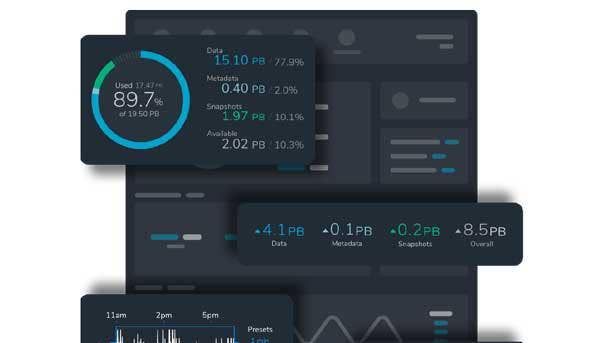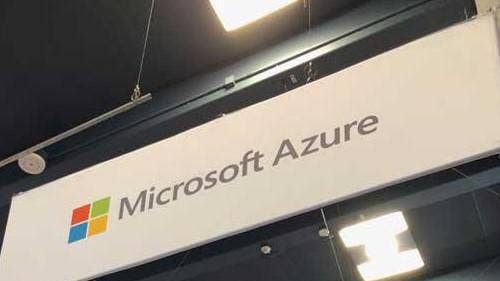Qumulo CEO Bill Richter On Laying Off 80 Employees, Focus On Being ‘All-Channel’
“What’s changed is just our perspective on the path to profitability. And we’ve been doing really well in the talent wars, and we’ve scaled up the workforce pretty heavily,’ Qumulo’s CEO tells CRN.

Balancing Act With An Eye On The Future
Employees of Seattle-based cloud storage technology developer Qumulo got hit June 29 with bad news as CEO Bill Richter told his team that the company laid off about 80 employees, or about 19 percent of its head count, as the company looked at ways to balance its resources for future growth.
The growth in cloud storage requirements as the amount of data businesses store grows and the ways they store that data changes is there, Richter told CRN in an exclusive interview. However, he said, while engineering and sales teams need more people to meet that growth, at the same time other parts of the company were not as essential and, given the current macroeconomic environment, the company made the painful decision to reduce those teams.
“What’s changed is just our perspective on the path to profitability,” Richter said. “And we’ve been doing really well in the talent wars, and we’ve scaled up the workforce pretty heavily. But you go through an economic cycle like this, and you’re like, ‘Hey, have we hired in certain places to aggressively? Can we run more lean? And by virtue of running leaner, go faster?’”
While much has been made in the past couple years of a talent shortage, Qumulo joins a growing list of tech companies, especially in the security industry, that have laid off employees.
Qumulo, which was founded in 2012, has received $300 million-plus in funding, and has enough cash on hand to reach profitability, Richter said. In addition, the company has access to a pool of credit that it does not plan on using, he said.
“Now, will we raise additional capital when capital becomes less expensive?” he said. “We might, but the plan for the businesses is become profitable with the strong balance sheet that we have today.”
Here is a look at what is happening at Qumulo and what to expect from the company on the technology side for the second half of 2022.

Qumulo this week said it will lay off about 80 people. This comes after so much talk in the last year of a big tech talent shortage, but we’re now seeing more tech layoffs starting to happen. What’s Qumulo’s experience?
Starting at the highest level, the market for unstructured data management, like where we play in, the secular trends are actually really good. And it turns out that good economy versus bad economy, data production in the world doesn’t correlate to economic cycles. I feel fortunate that we operate there. Storing and managing data is not a ‘nice-to-have’ for customers. It’s a ‘must-have.’ So in terms of the broad market, we feel really good.
What’s changed is just our perspective on the path to profitability. And we’ve been doing really well in the talent wars, and we’ve scaled up the workforce pretty heavily. But you go through an economic cycle like this, and you’re like, ‘Hey, have we hired in certain places too aggressively? Can we run more lean? And by virtue of running leaner, go faster?’ And we came to the conclusion that, given all those factors, it was time to make the change. And I’m not one to try to make incremental change and nip and tuck. We said, if we’re going to make a change, we’d rather do it once, do it holistically, and get back to our mission with customers.
Eighty people is what percentage of Qumulo’s workforce?
It’s pretty dynamic because we’re actually going to be hiring for the rest of the year. But we have about 350 people on staff right now, following the changes.

So in which areas were the layoffs more concentrated in?
We asked leaders to go through every nook and cranny of the business and be able to say this person’s tied to growth, they’re tied to innovation, or they’re doing an absolute business-critical need. And to the extent that areas of the business didn’t have clear answers to those questions, then we took the next path at looking at those roles, and those are the ones that sort of went into the pool for reduction.
Can you give an example of one or two of those roles?
We had people that were doing interesting work on internal data, about different metrics inside of the business and things like that to influence other groups. And we’re, it’s interesting, it’s nice to have, but in some cases it actually slows other groups down because they have to contribute to providing data and building reports and evaluating reports and meeting over reports. Broadly speaking, I’d say the vast majority of positions that were eliminated were non-critical or overhead.

You also said you’re hiring. How many people are you looking for now and in what areas?
There’s demand and territories where we want to place individuals to meet the demand. So we’ll be hiring sellers, for sure. And there’s a few places in our engineering group where we will continue to hire. Anything that is like what the message of the company is: If it drives innovation and drives top-line growth, then we’re interested in hiring.
That begs the question: As you talk to potential hires, and they see that the company has just done a round of layoffs, could that be a turnoff for some potential hires?
Well, if you think about it, it’s actually counterintuitive because the company that hasn’t been thinking about profitability, you’re actually at further risk for joining them knowing that at some point these decisions come for any business. Versus going to Qumulo where we’ve just restructured the business, have a clear path to profitability, are prioritizing the long term. You’re far better off joining that place than someone that’s not thinking that way. Anyone who’s not thinking about long-term sustainability right now is making a mistake.

Define Qumulo. How do you describe Qumulo to potential clients?
It’s really simple. We help customers store, manage and curate their data, anywhere and forever. And what makes us different is there’s a whole bunch of storage companies. But they don’t allow you to manage or curate your data. And they definitely don’t allow you to do it anywhere. And that’s what really makes us different. We have really robust analytics. They’re always real time that allows for completely automated management. We offer a powerful API that allows customers to curate their data. And the anywhere part of this is really important. We run as software in data centers, and we run as a service in public clouds. And if you talk to any customer about their cloud strategy, they will almost all say it’s multi-cloud. And so anywhere really matters to them. And the forever part kind links back to the conversation we were having earlier. We want to be able to make that promise to customers forever. And when we looked at our mission and thought about sustainability, that was one of the reasons that we made the changes.
And when you talk about managing storage, are you talking primary or secondary storage?
We’re both. Our customers run mission-critical primary applications right on Qumulo. It’s mostly primary data. It’s just that primary become secondary in customer environments. So that’s part of the management curation capability that we offer. Qumulo is not a backup company. That’s not what we do.

How much funding has Qumulo raised?
A little over $300 million.
Does the company have enough cash in the bank to get it to cash-flow-positive?
We do. We have a really strong balance sheet. So we’re doing this from a position of strength. We have a really strong balance sheet. We have access to a large credit pool and have no plans to tap that credit pool. So we’re super well capitalized. And the operating mantra of the business is to become profitable with the cash that we have in bank without the need to raise additional capital. Now, will we raise additional capital when capital becomes less expensive? We might, but the plan for the business is to become profitable with the strong balance sheet that we have today.
When we say ‘profitable,’ do you mean profitable or cash-flow-positive?
Well, let’s start with the GAAP stuff makes things weird because of stuff like stock option costs. But we are generating cash.
I’ll just tell you--you didn’t ask--but I was going to give you our philosophy on this. What customers buy from Qumulo is really two things. They buy current product capability, and they buy a long-term commitment to service and innovation. And if you’re only making half that promise to them, then you’re failing them. And so the [layoffs] allow us to continue to make both those promises: the capability you buy today, and long-term service and innovation.

As you look at the rest of 2022, what are some things we might expect to see from Qumulo in terms of new products?
You’re going to see some really cool stuff around ‘anywhere.’ We launched the first version of our service on [Microsoft] Azure earlier this year, and that continues to be a really strong investment area for us. The public cloud capabilities around our products allow customers to seamlessly take applications and datasets that might be stored on-premises and allow them to easily move them to public clouds, and in some cases back from public clouds to on-premises, depending on what’s going on in a customer’s business. Or from cloud to cloud. The management capabilities of our products, like the set of real-time analytics to allow customers to make business decisions, there is a series of development efforts to make those better and better and more capable throughout this year. Actually, I think our innovation and product delivery is going to accelerate in the back half of the year.

You just mentioned the relationship offering the first Qumulo services on Azure this year. How about Google and AWS?
We run on all three public clouds today. And we have deployed customers on all three public clouds running mission-critical applications. And we’ll continue doing that. We’re not in Oracle or Tencent or some of those other similar clouds. But when we cover the top three, we’re covering like 90 percent of the market.
Are there some differences in how Qumulo works with the different clouds?
When customers run Qumulo on AWS, they take our software, and it’s deployed as an image on AWS and they manage it. And many customers love that. When we went to Azure, which was our third public cloud, we made the decision to offer our product as a service, period. So the customer doesn’t manage the software. They never upgrade the software. They just consume Qumulo data services.
And that’s only on Azure for now?
Today, it’s only on Azure, but I’ll tell you that the long-term vision looks a lot like that for everybody. And makes us really different from some of the other companies that you might cover in the space. First of all, the legacy folks are very much box sellers and are cloud-adverse. Even though they will talk a lot about public clouds, if you really poke, there’s nothing there. And even some of the newer, very storage-centric entrants to the market are doing basically hardware optimizations for on prem-only. And our vision is just much broader than that. We think that it’s going to be a multi-cloud world. We think that unstructured data matters, and we think customers need the capability to run anywhere.

Qumulo has a channel-only focus, right?
There was some fun news earlier from earlier this week. We won HPE’s Strategic Storage Partner of the Year. And you know they partner a lot. So if you want any sort of sense, or just like something that’s interesting for the channel, that relationship continues to go really well. We think being able to provide our software capability through others is really strategic. Customers love that they don’t have any vendor lock-in. So it’s really cool.
What are the vendors you work with in a similar vein?
Fujitsu, Supermicro, Western Digital, Quanta. For instance, customers can buy Qumulo deployed on Quanta, and partners can buy all that directly from Arrow.
And your company has no direct sales, correct?
No. We’re 100 percent channel. And we will continue to be all-channel. Absolutely no plans to change that. We build really powerful software. And we like to partner to offer complete solutions to customers.